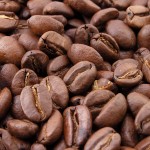From Harvard: a two years old trial found that diabetic women who drank coffee had 10% less inflammation in their blood vessels, shown by lower CRP levels than controls for each additional cup of coffee drunk per day. These results are much better than the recent Crestor statin trial on CRP. From other research, the likely antiiflammatory constituent is chlorogenic acid, also present in blueberries.
Am J Clin Nutr. 2006 Oct;84(4):888-93.
Coffee consumption and markers of inflammation and endothelial dysfunction in healthy and diabetic women.
Lopez-Garcia E, van Dam RM, Qi L, Hu FB.
Department of Nutrition and Epidemiology, Harvard Medical School, Boston, MA,
USA. esther.lopez@uam.es
BACKGROUND: In several short-term studies, coffee consumption has been associated
with impairment of endothelial function. OBJECTIVE: The objective was to assess the relation  between long-term caffeinated and decaffeinated filtered coffee consumption and markers of inflammation and endothelial dysfunction. … CONCLUSIONS: These results indicate that neither caffeinated nor decaffeinated filtered coffee has a detrimental effect on endothelial function. In contrast, the results suggest that coffee consumption is inversely associated with markers of inflammation and endothelial dysfunction.
between long-term caffeinated and decaffeinated filtered coffee consumption and markers of inflammation and endothelial dysfunction. … CONCLUSIONS: These results indicate that neither caffeinated nor decaffeinated filtered coffee has a detrimental effect on endothelial function. In contrast, the results suggest that coffee consumption is inversely associated with markers of inflammation and endothelial dysfunction.
